Illinois Baptist
4 reasons to support MIO Mission
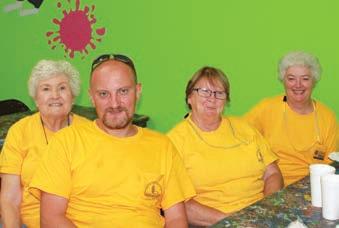







Chicago | “This is by far the biggest mission field we have in our state, with a population that is unchurched, unbelieving, and much in need of the gospel,” Dennis Conner told 181 students who converged in the Windy City for a week-long church planting mission trip in July. As Church Planting Director in the Northeast region, Conner challenged the high school students from 14 churches mostly in downstate Illinois to develop “a love for this place and the people who live here.”
About 10 million people live in Chicagoland, but fewer than onefourth of them have a relationship with Jesus Christ. And only about one-tenth of the people are connected to an evangelical church. Developing a pipeline of future church leaders and planters prompted IBSA to create ChicaGO Week, a student missions project unique to Illinois.

Participation in ChicaGO Week tripled in its second year.



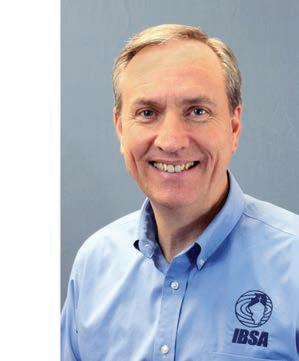
“Although 2014 donations (to religion) reached a new high of $114.90 billion, and, as always, accounted for the largest percentage of donations, the fact is, this category is continuing its 30-year dramatic downward slide as a share of total giving.”
– David H. King, chair of the Giving Institute

culture: religion tops all giving
Up
in 2014
Religion $114.90 B
Education $54.62 B
Human Services $42.10 B
Health $30.37 B
Arts/Culture $17.23 B
Environment/Animals $10.50 B
Public-Society Benefit $26.29 B
Foundations $41.62 B

International Affairs $15.10 B
As a state association of almost a thousand churches, we challenge one another every year to give a special offering in support of the Great Commission task we share here in Illinois. While September is the focused time for emphasizing the Mission Illinois Offering, churches or individuals can give at any time during the year.

But if you’re like me, someone appeals to you every month, perhaps every day, to give to a different need or cause. How do you decide what to prioritize in your giving? What deserves your most loyal and generous support? Let me share what I try to communicate consistently about why I give generously to the Mission Illinois Offering, and why I urge others to do the same.
First, I want my giving to be focused on delivering the Gospel.
Second, I want my giving to prioritize the work of local churches.
Third, I want my giving to partner with those who believe and teach Baptist doctrine.
Fourth, I want my giving to be entrusted to people and organizations that are both effective and accountable.
Frankly, the Mission Illinois Offering gives me one of the best, most trustworthy channels available for meeting all four of those criteria. Here’s why I prioritize it in my own personal stewardship:
The MIO is focused on delivering the Gospel. Each year, more than 300 IBSA churches receive customized training in evangelism, and many others receive resources or financial assistance with evangelistic events. In addition, more than 80 evangelistic church plants are currently underway in Illinois, about 25 being started each year, each one pressing the Gospel into urban neighborhoods or unreached communities and seeing new people come to faith in Christ. Our shared missionary efforts on college campuses or through urban ministries like the Christian Activity Center all deliver the Gospel as their top priority.
The MIO prioritizes the work of local churches. There are many good parachurch organizations and charities that are doing many good things, and I personally support some of those. But I believe that God’s primary, enduring channel for delivering the Gospel and making disciples is the body of Christ expressed in local, New Testament churches. The MIO helps deliver direct assistance and encouragement to local churches through training, consultation, conflict resolution, and countless other resources designed to strengthen local churches into greater effectiveness.
The MIO partners with those who believe and teach Baptist doctrine. In addition to parachurch groups, I believe there are many other churches, especially evangelicals, who are also advancing the Gospel and making disciples. If resources were unlimited, I would probably support them all! But I want to reserve my most generous missions giving for the efforts of missionaries and church planters and pastors and churches who understand and teach the Bible and at least its broad doctrines consistently with Southern Baptists around the world and across the generations.
Editor - Eric Reed
Managing Editor - Meredith Flynn
Contributing Editor - Lisa Sergent
Graphic Designer - Kris Kell
Administrative Assistant - Andrea Hammond

Intern - Morgan Jackson
For questions about subscriptions, articles, or upcoming events, contact the Illinois Baptist at (217) 391-3110 or IllinoisBaptist@IBSA.org
The Illinois Baptist is seeking news from IBSA churches. E-mail us at IllinoisBaptist@IBSA.org to tell us about special events and new ministry staff.

POSTMASTER: The Illinois Baptist is owned and published every three weeks by the Illinois Baptist State Association, 3085 Stevenson Drive, Springfield, Illinois 62703-4440. Subscriptions are free to Illinois Baptists. Subscribe online at IBSA.org
And finally, the MIO is entrusted to those who are both effective and accountable. Every year Illinois Baptist churches elect boards and committees that oversee the work of IBSA. Devoted staff members are employed to work hard at the above priorities, and to deliver detailed, public reports of the results, the finances, and the continued needs of our cooperative work advancing the Gospel. I can always know how my MIO dollar is invested and what results it is producing.
Illinois is a flat state geographically, but the task of advancing the Gospel and establishing effective Baptist churches here is often a steep, uphill climb. It’s only possible through the sacrificial, cooperative giving of Baptist people in Baptist churches. I hope the above answers to the question, “Why Mission Illinois?” will give you the same strong motivation I have again this year to give generously through the Mission Illinois Offering.
(If your church does not collect a formal Mission Illinois Offering, you can still contribute directly by going to www.ibsa.org and clicking on the “donate” tab. Or mail your gift labeled “MIO” directly to IBSA at 3085 Stevenson Dr., Springfield, IL 62703.)
Nate Adams is executive director of the Illinois Baptist State Association. Respond to his column at IllinoisBaptist@IBSA.org.
Continued from page 1
The week-long in-reach into the city pairs student ministry teams with church planters at a different site each day. The project is a partnership with Judson University in suburban Elgin, where the students are housed, fed, and share twice-daily worship services.
Before sending everyone into Chicago on Monday morning, IBSA Executive Director Nate Adams, explained the “why” of church planting, saying, “The simple answer is this: to bring the gospel to lost people.”
Asked what she was most excited about for the week, Jessika Bun from Calvary Baptist Church in Elgin said, “Getting to share the Gospel with people on the streets and reaching out to the community.” Samantha Leon, also from Calvary, said she was most looking forward to interacting with other youth groups, making new friends, and bringing joy to others with their service.
And that’s what they did. The students met with planters in North Side, South Side, and Near West neighborhoods. They painted and landscaped at public school facilities (see photo above), distributed food and clothes to residents in need, and talked with strangers about their faith.

“The hope is that these experiences will allow youth to see how
the city could be a place where they might come some day to build a life, build family, and build ministry,” said Edward Jones, IBSA’s African American Church Planting Catalyst.
Adams expressed confidence in the project as a pipeline for future church planters.
“It may be years before these students…have an opportunity to be a planter or be part of a planting team, but the pipeline is already growing, Adams said, pointing to college-age interns and summer missionaries presently at work in Chicagoland. “It is a long-term investment, but I think the fruits of it may be here sooner than we might expect.”
Cliff Easter, pastor of First Baptist Church of Metropolis, brought a group of students from his far downstate community. Some of them had never been to Chicago before. “They see this as a cause, and they want to be a part of the solution. That’s what I’m excited about,” Easter said.
When the team returned home, the students shared their experiences with the Metropolis church in a lively and challenging presentation. “It inspired them to see the need, and they got it,” their pastor said. Now some of the students are asking how to take the next step and to become church planting interns.
See more stories from ChicaGO Week on pages 7-8.
Springfield, Ill. | Without any fanfare, Illinois Governor Bruce Rauner (right) has signed into law a bill which bans therapists from trying to change the sexual orientation or gender identity of anyone younger than 18. Therapists who violate the law could be subject to fines and revocation of their professional licenses.

The Youth Mental Health Protection Act was passed in the spring legislative session and was sent to Gov. Rauner in May for his signature and was signed August 20.
Doug Devore, Executive Director of Baptist Children’s Home and Family Services, an IBSA sister organization based in Carmi, told the Illinois Baptist that issues of sexual orientation do occur “on occasion with children in our residential care program and in our Pathways counseling ministry

who have issues with their sexual orientation. Using God’s Word as the foundation, our therapists are always ready to use an educational approach to help children discuss their concerns or thoughts about their sexuality.
He shared how the ban will affect BCHFS: “We expect all of our staff to honor the law, ethical standards and licensing requirements regarding the care and treatment of children. Therefore, in light of this new Youth Mental Health Protection Act signed into law in Illinois, our staff will not be involved in any sexual orientation change efforts. But we will always be ready to share our faith and values regarding sexual orientation and Biblical marriage.”
California, New Jersey, and the District of Columbia already have such bans in place.
Cartersville, Ga. | On the evening before she and her family had planned to return overseas, Kyra Lynn Karr, a Southern Baptist missionary to Italy, was killed in a traffic accident on Aug. 13.

News reports indicate a tractor-trailer driver exited his vehicle to conduct a safety inspection but the safety brake was not engaged and the truck began to roll. The vehicle hit the pickup in which Karr was traveling, crushing it against the highway guardrail on U.S. 41 in Bartow County, Ga. Karr, 30, died at the scene.
Her husband Reid and their two
youngest children were transported to nearby hospitals, where they were treated and released. Their oldest child was not with them at the time.
The tractor-trailer driverwas arrested and charged with DUI.
“Kyra is a shining example of a life well lived: as wife, as mom and, most importantly, as follower of Christ committed to proclaiming His gospel in dark places and among difficult to reach people,” said IMB President David Platt at her Aug. 19 funeral.
The Karrs had served in Italy five years and were set to return after a sabbatical stateside.
heading out again to their worksites.
How an unlikely DR volunteer answered the call
 BY MORGAN JACKSON
BY MORGAN JACKSON
Imagine that you’re an immigrant living in the U.S., here to create a better life for your family. But, after 14 years, many of those family members are still in your home country while you raise the money and work through government red tape to bring them over. What do you do in the meantime?
Volunteer with Southern Baptist Disaster Relief.

That may not be the expected answer to the question, but Cosmin Hansa, origi nally from Romania, has found valuable use for his time as a relief worker. Hansa gave a week of his time August 16-22 to do chainsaw work in Sublette, Illinois. An F2 tornado struck Woodhaven Lakes, a large camping resort, two months ago.
When calamities like this hit, Southern Baptist Disaster Relief Teams answer the call and travel to wherever help is needed. Anyone over age 18 can train and volunteer with Disaster Relief, but most DR workers are retirees, given their more flexible schedules. So picture the contrast between Hansa, a middle-aged man with a lively Romanian accent and the 119 other volunteers in Sublette.
Hansa explained that his wife, Monica, led him to Christ many years ago. They both grew up “Christian,” yet never understood what having a relationship with Jesus was like. A year before they met she was baptized, and once married she began leading her husband to the Lord. “In a quiet way,” Hansa described, “I think that’s why it worked. She’s a gift from God.”
In 2001, Hansa came to the U.S. and worked various jobs in the Chicago area for 11 years. He then moved to Lake County where he said he met his now good friend, Mike. “He was my neighbor actually. We got talking, I started witnessing to him, he started witnessing to me. Then I said, ‘Hold up, we’re preaching to the choir!’”
They discussed church and local volunteer opportunities, and before he knew it, Hansa was helping with DR relief efforts following Hurricane Sandy in 2013. He still prays that God will soon reunite him with his wife and two sons who remain in Romania. But until then he serves faithfully, one tree branch at a time.
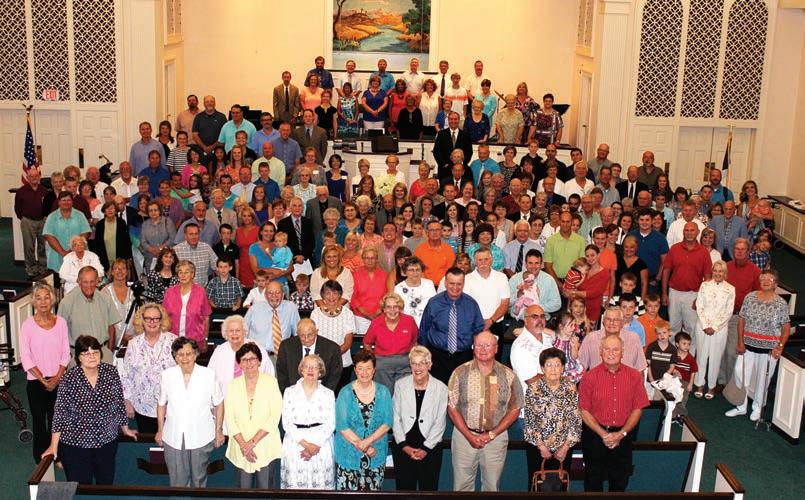
Sesquicentennials celebrate faith and forbears
1865 was a long time ago. It’s the year the Civil War ended. The Southern Baptist Convention was 20 years old. Illinois had been a state less than 50 years. Illinois had just made its lasting mark on the Union with the presidency of Abraham Lincoln, and in that year his death. And in four Illinois towns, people banded together at the end of the war to face into the future with faith, founding churches that are alive and active today.
First Baptist Church of Herrin, First Baptist Church of Marion, First Baptist Church of Pinckneyville, and Nilwood Baptist Church are all marking their 150th anniversaries this year. (Two IBSA churches, Sandy Creek in Tamms, and Pleasant Grove near Iuka, are older, observing their 175th anniversaries this year.)
For FBC Pinckneyville, their sesquicentennial is opportunity to celebrate God’s faithfulness through the years and the church’s contribution to Southern Baptist missions in Illinois across 15 decades. “One of the things that just kept popping up,” anniversary planner Ramona Hatch told the Southern Illinoisan newspaper as she read the minutes of many church business meetings, “was that even though the church was doing other things, their commitment to missions never waivered.”
The first organizational meeting was held July 30, 1865, at the Old Temperance Hall. “They got together for the purpose of forming a church body, not a church building,” Hatch said.
Within three years, the church had built the first of three sanctuaries on their site, and launched missions support that birthed 22 churches and helped found the Illinois Baptist State Association. It was at FBC Pinckneyville that IBSA held its first annual meeting in 1907. (A pew from the church’s second sanctuary, site of IBSA’s founding meeting, is in the prayer room at IBSA.)
Three pastors have served as IBSA executive director: I.E. Lee (1911-1915), I.E. Miller (1929-1935), and Maurice Swinford (1958-1968). Charles Boling, who is retiring as Director of Missions for Williamson Association in September, was the church’s longest serving pastor at 18 years.
Jay Lowder is the current pastor. Lowder describes his congregation as attentive to the Word. “That’s what they were looking for—clear, plain, explanation of God’s word—and they have very high standards for that.”
With the celebration of 150 years, the church is looking not only at its past, but to the future: “Will the people who come after us find us faithful?” Hatch asked. “Will they follow in our footsteps…and (are we) leaving footsteps for them that are clear and appropriate?”
FBC Herrin will observe its 150th anniversary in October. FBC Marion will host the IBSA annual meeting Nov. 11-12 as part of its festivities. Look for more on their celebrations in future issues.
– with info from Stephanie Ester, Southern Illinoisan

The generation that mostly missed out on RAs and GAs has discovered missions. And it’s so hot that it’s cool.
About 13,000 people, mostly young adults, attended the SEND North America Conference at Nashville’s Bridgestone Arena August 3-4. The sold-out event was sponsored by the North American Mission Board (NAMB) and the International Mission Board (IMB).
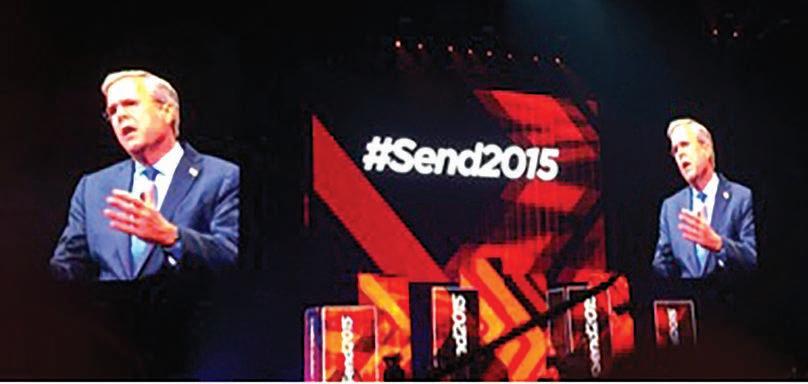
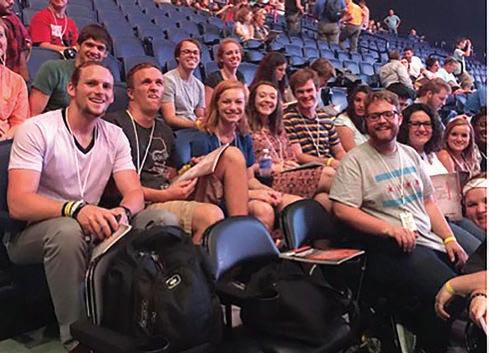
Going in to the event, a young Canadian, Esther Fasolino, had a single word to explain why she was attending, “Missions!”
Fasolino is a member of Immanuel Baptist Church in Toronto and was enthusiastic about this highly anticipated conference. “We’ve come to learn,” she said. “The breakout topics are fantastic.” Her friend, Ivonne Anlar, chimed in, “We want to share the experience with as many people as we can.”
A group of summer missionaries serving in Chicago attended the event, along with IBSA church planters and missionaries. The atmosphere was great, said IBSA’s Charles Campbell. “The main voice that I heard was this: every life needs to be lived on mission. Don’t waste the opportunity, and use the gifts God has given you to make an impact for him.”
Carmen Halsey, IBSA’s women’s ministry director, said the “two-day program was packed with quality speakers, timely
breakout topics, premiere worship leaders, cutting edge technology, and hundreds of volunteers prepared to greet and host us.” The visual production of the event was more typical of a rock concert than a church conference – done intentionally to draw young adults. Worship was led by David Crowder, Casting Crowns, Shane and Shane, and the Passion worship band.
“This conference is about aligning our lives behind God’s plan to advance His kingdom,” said NAMB’s organizer Aaron Coe. “We want to change the conversation and help people understand they are ministers. God wants us to use each of these people to share the Gospel with their neighbors and friends. I can’t wait to see what God will do.”
IBSA mission mobilizer Rex Alexander was especially moved by the preaching of IMB president David Platt. “I just love his passion. Every time he speaks it’s a great encouragement to me to keep doing what I’m doing here in Illinois with missions and helping our people move towards the ends of the earth.”
Some observers noted that attendance doubled the Southern Baptist Convention’s prayer event at the Annual Meeting in Columbus, Ohio. SBC President Ronnie Floyd saw SEND as complementary, rather than competition.
“…as 13,000 of us gathered this past week in Nashville, focusing on living our lives on mission with God, it was evident that God is working,” Floyd wrote in an Aug. 10 blog post. “What we saw and experienced in our SEND Conference in Nashville is the coming Southern Baptist Convention where the arena is filled with enthusiasm and life, abounding in young adults and ethnic diversity.”
More than 65,000 protesters gathered outside Planned Parenthood Clinics across the U.S. August 22. The protesters demanded the halt of government funding for the organization which funds abortions, provides birth control medications, and other women’s health services.

The protests followed the release of several videos produced by the Center for Medical Progress which show Planned Parenthood employees bargaining over the sale of aborted infants’ body parts to research facilities.
The reported 342 demonstrations were organized by the Pro-Life Action League.
The Internal Revenue Service will not revoke the tax-exempt status of religious organizations that object to same-sex marriage, IRS Commissioner John Koskinen (right) has promised at least twice in recent weeks.
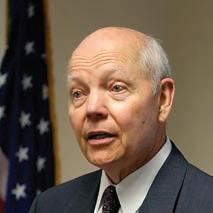
But some tax code experts say the commissioner’s commitments are not a guarantee of tax shelter for organizations. “Leaders of religious organizations must also keep in mind that federal income tax exemption is only one front with respect to this issue,” CPA Michael Batts noted. “State and local tax exemptions of various types, as well as other areas of law like housing, zoning and land use are administered by countless agencies all over the country. Federal, state and local officials administering these other areas of law are not bound by the comments of the IRS commissioner or, for the most part, by federal tax law.”
Union University informed the Council for Christian Colleges and Universities (CCCU) that it will withdraw from the coalition in the wake of two member schools changing their hiring policies to include same-sex couples.

The move comes after Mennonite-affiliated Goshen College, a CCCU member, announced that it would extend benefits to the spouses of legally married same-sex couples.
– Baptist Press, Christianity Today, World Magazine
We’ve been expecting you! Our managing editor Meredith Flynn and her husband, Chris, welcomed their first child on August 5. Baby Lucy weighed in at 8 pounds, 1 ounce, truly a blessing from God.
Meredith was texting and e-mailing during the early stages of labor, something we did not expect. Mostly she was checking on her contributions to the next two or three issues of the newspaper, but we got baby-progress reports too. At one point, after a painkiller was administered, she texted, “We would name the baby ‘Epidural’ if it didn’t already say ‘Lucy’ on her bedroom wall.”
Welcome to the world, Lucy Flynn.
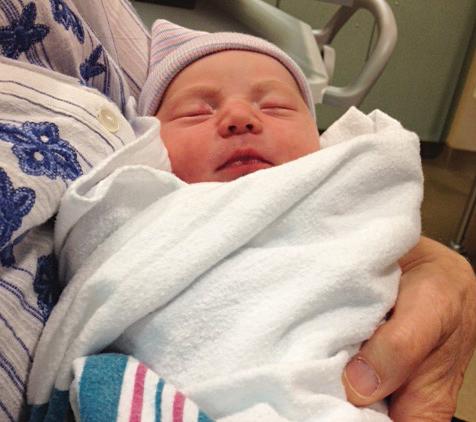
(Editor’s note: Our friend and co-worker Esther Eggley shared a special thought with the IBSA staff recently. If you have worked with children and youth at VBS or summer camp and wondered if you were really having any impact on those young lives, let Esther’s experience encourage you.)
I have been struggling with feeling that the best of my life is past. Sometimes I wonder if anything I have done has been Kingdom worthy. In years past I have served as a youth department director, Bible study leader and mission trip sponsor, among other things.
(During one week in July), Facebook was a vehicle of encouragement to me. I have observed FB posts from former youth I had the privilege to work with who are now leaders. One post listed a concern about getting a building ready for VBS because in Okinawa they were expecting a major typhoon.
One gal was thrilled with the attendance of her VBS in Nevada. Another gal was highly excited with the events taking place at Glorieta, New Mexico, with her youth group
from Texas. Two people were busy working here in Illinois with their VBS. Another was sharing her experiences from her VBS in Virginia. One fellow was busy with VBS in Ohio and another one in New Mexico. Recently, I ran into a lady I had not seen for close to twenty years. I was happy to find out that she is very active in a Southern Baptist church in Nashville, Tennessee. Her sister’s family is very involved planting a church in Wyoming.
I’ve been encouraged and blessed with this information. I hope this does not come across as braggadocios, but I feel God gave me the privilege to serve him in some small way and that makes me happy. It is my hope that God has more for me to do in the future, but for a day or two I think I will just enjoy thinking about how these young lives are serving the Lord.

Esther reports her church, Chatham Baptist, witnessed the salvation of 9 children in VBS this summer.
“Therefore, my beloved brothers, be steadfast, immovable, always abounding in the work of the Lord, knowing that in the Lord your labor is not in vain” (1 Cor 15:56).
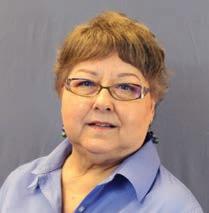
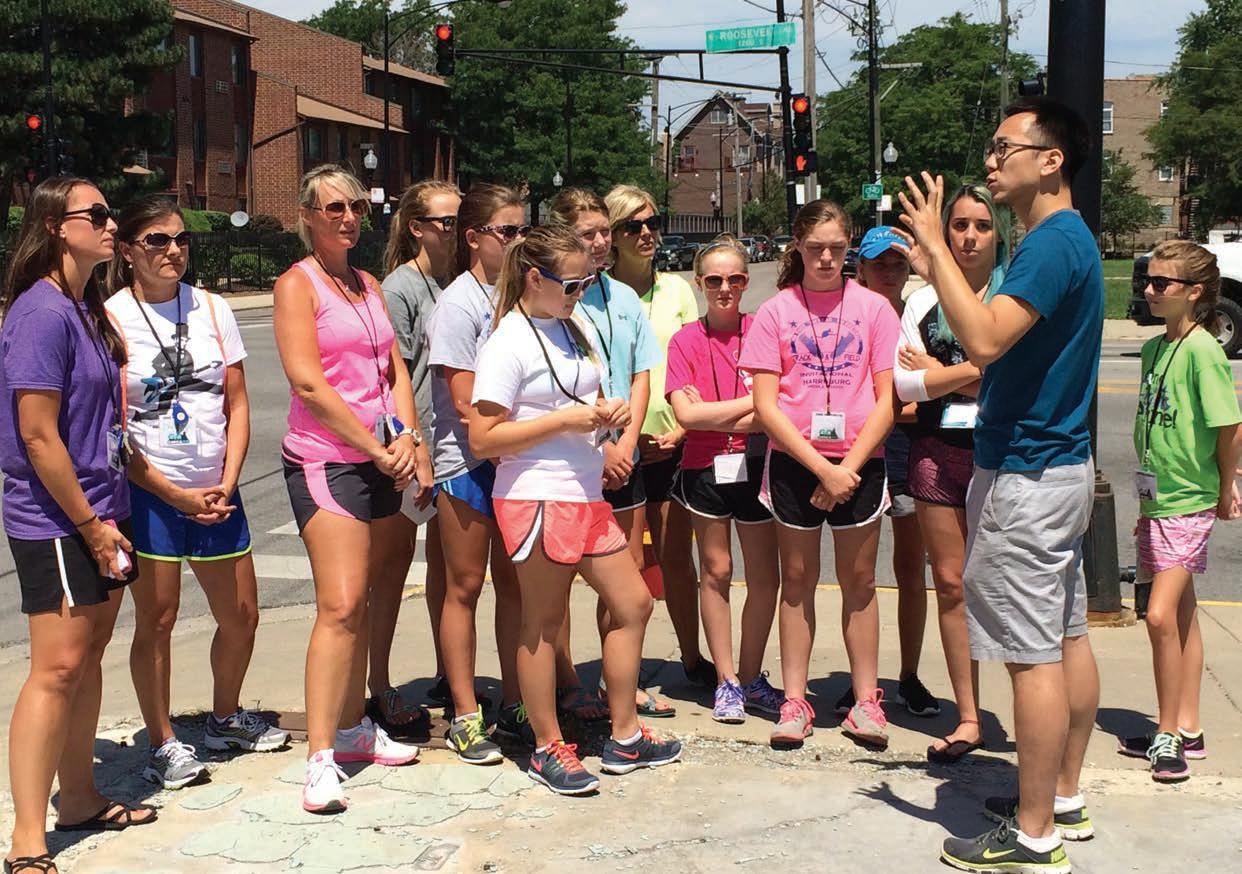 BY MORGAN JACKSON
BY MORGAN JACKSON
Chicago | They call themselves HMS Girls Bible Study. Group leader Laura Winkleman said the nine 7th and 8th grade girls she brought to Chicago go to the same Harrisburg middle school, but that “this is a unique group in that we don’t all belong to the same church.”
They began meeting in Winkleman’s home a few years ago—doing Bible studies, praying together, encouraging one another to seek out other believers at school. Wife of First Baptist Church of Harrisburg pastor Chris Winkleman, Laura and the girls decided to go on a mission trip. When she came across ChicaGO Week,
she thought, “This might be a good one for my group!”
For some of the girls, this was their first time traveling so far north in Illinois. One of their other adult leaders, Christy Shires, said, “I don’t know what exactly we’re going to be doing. I’m an organized person. I usually have a plan. So this is good for me, to just go in faith instead.”
What they found upon arrival at Judson University in Elgin, where they would stay between daily trips into the city, was 181 students and leaders just like them— mostly from outside the city and excited about a week of ministry in Chicago.
ChicaGO Week launched in 2014 as a partnership between Judson, IBSA, and Chicagoland church planters to give students exposure to the city, its vast spiritual needs, and their own opportunity to bring transformation as missionaries and future church planters.
Most of the students had never seen Chicago before, much less spent a week in its teeming neighborhoods. Between bouts of singing and silliness in the hour-long ride into the city, the young girls expressed excitement about many things—worship
Continued on page 8
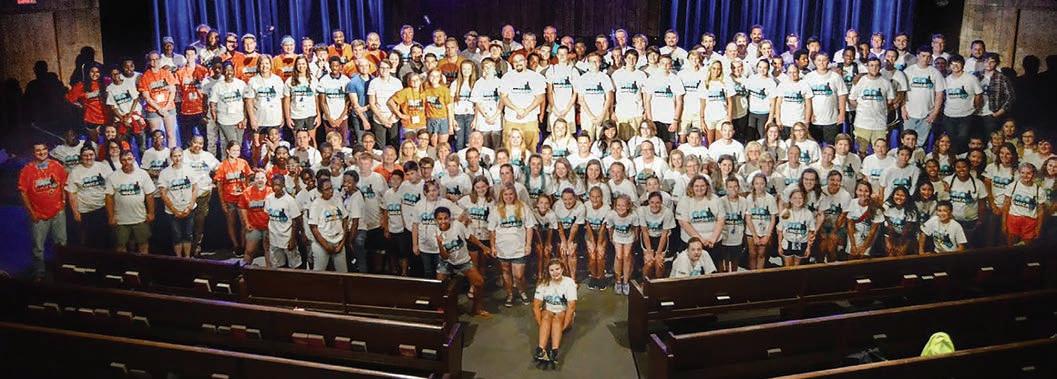
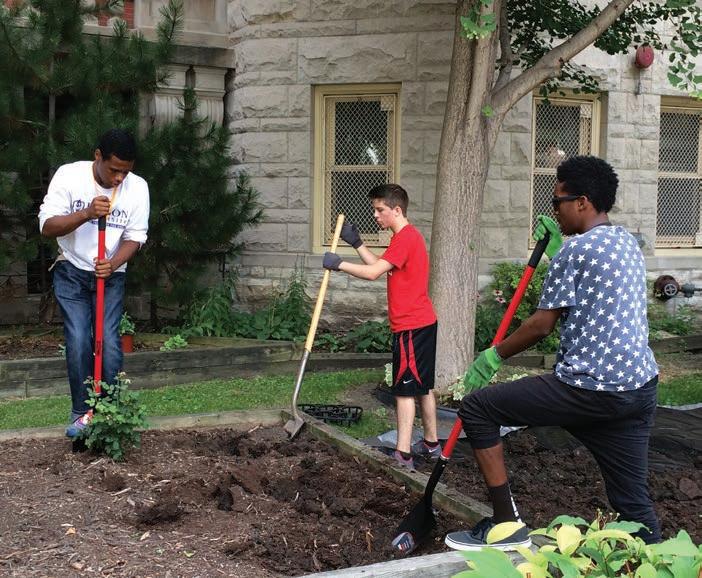
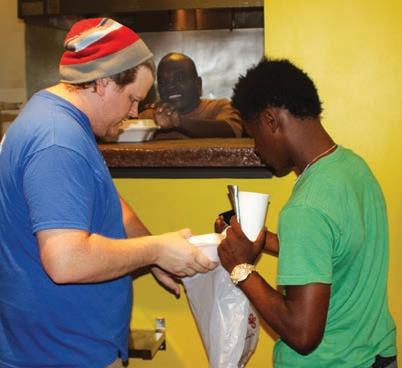
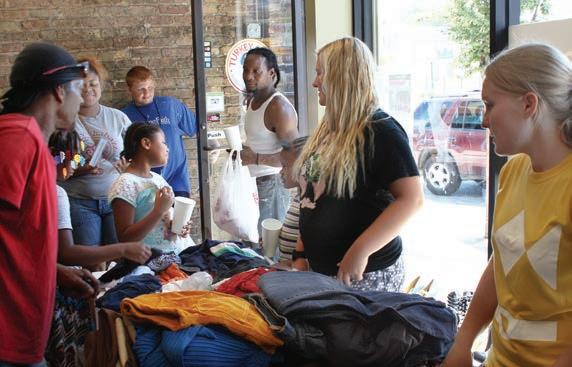
Continued from page 7
services at Judson’s chapel, anticipation about what God had planned for them, and something about a taco cart. (More on that later.)
The Harrisburg team—one of 14 from across Illinois—partnered all week with Church of the Beloved (COTB) and planter Daniel Chung in Chicago’s Near West neighborhood. Chung explained his church’s vision, that COTB is trying to show the local community that the gospel is greater than all worldly barriers. “We want to be a neighborhood church—one of the most welcoming churches in Chicago.”
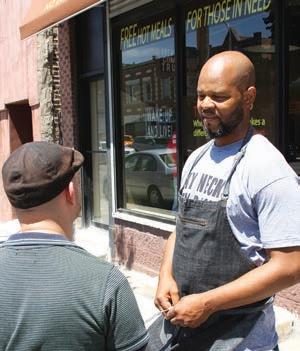
Near West is comprised of 58,000 people in two square miles; multiple languages and ethnicities are represented, but only 10 evangelical churches exist for people to attend. Compared to Harrisburg, a town of 10,000 where the population is 90% Caucasian and there’s a church on every corner, it’s no wonder there were audible gasps as Daniel listed the facts.
On Monday, the girls were hesitant about what the next few days
would bring. Chung eased them into the week with prayerwalking on the University of Illinois at Chicago (UIC) campus. On Tuesday they cleaned up a run-down park, had several conversations with people in the community, and handed out questionnaires to help Chung gain information about neighborhood opinions.
On Wednesday they rented a taco truck during lunch and gave away free food. Winkleman said, “The taco cart was by far our favorite day. We couldn’t believe the amount of people that came. We actually ran out of tacos before it was over!”
The girls talked with people while they ate, helping put some friendly faces to the name “Church of the Beloved.” Laura said,
“It was amazing the amount of people who had no church at all. I really felt like we were beneficial for (Daniel) that day for sure.”
“At first I was worried about having middle schoolers,” Chung admitted of his partner-team. “I didn’t really know what to expect, but it turned out to be a blessing. God knows what he’s doing. By the third day, these girls were super outgoing and wanted to spend
more time investing in people than anything else.”
On Thursday they concluded their time together with a debriefing and some more prayerwalking, this time on Michigan Avenue where there is not one evangelical church. The group also got to experience some sightseeing, a treat for the small-town girls.
“You know, we totally could do this in our community,” one girl said. And they have. The HMS team recently set up a lemonade stand at a Harrisburg town event, giving away 300 cups of lemonade and sharing the love of Christ with their neighbors.
“It was really exciting for me to see these girls go on this trip,” their leader concluded, “and then put the principles into practice when they went home.”
Chung reported that because of the group’s investment in his church plant, two people have since attended their worship services who probably would not have without the prompting of a few teenage girls and some free tacos.
“Without the support of IBSA and churches, we as a church plant would not have been able to do this for our community,” the planter said. “We are so grateful for the partnership we were able to build.”
Youth Choir tours five states
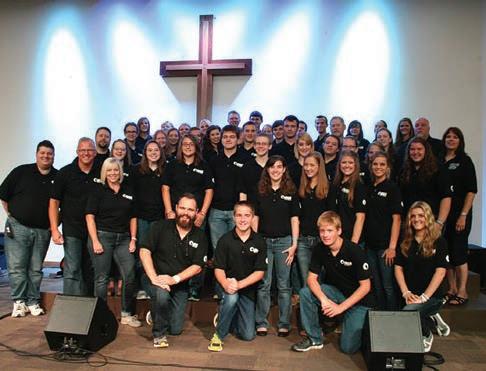
Illinois’ All State Youth Choir set off on their annual tour Saturday, July 18. Below are a few highlights, adapted from posts by IBSA’s Director of Worship and Church Music Ministries, Steve Hamrick:
Day 1: We have had an awesome start to the 2015 mission tour. The choir sang a full set right in the middle of Raging Rivers Water Park in Grafton, Ill. There were thousands of people there.
Day 2: This morning the choir led worship at First Baptist Church, Columbia, Ill., then checked into a hotel. We sang a concert set, the National Anthem, and Take Me Out to the Ball game at the Gateway Grizzlies game.
Day 3: We had a great group lunch at Lambert’s Cafe. Students got to pray out loud for the wait crew and hand out some gospel tracts. We got the privilege to sing, act, preach and sign the gospel for the residents of Grace Mission and members of Eastside Baptist Church.
Day 4: We are now heading to Olive Branch, Miss., to do a one-day VBS at a YMCA, then a full concert at FBC Olive Branch.
Day 5: We started early with a short drive to Graceland in Memphis. The choir toured the mansion and then set up and sang a concert for the tourists. After Graceland, we flash mobbed Chick-Fil-A and sang “In Christ Alone.”
Later that day, Hamrick learned his father-in-law had died. The choir ministered to his family by praying for them and singing “In Christ Alone” via a FaceTime call.
Day 6: At FBC, Sedalia, Mo., the choir sang a full concert with all their music, drama, sign, movement and testimonies. Elizabeth Ratsch, Morgan Denbo, and Lucas Carroll spoke of how God was working in their lives. It was very moving.
Day 7: As always, this has been the best tour ever, but I am sure next year will still be better. Thanks for supporting the IBSA All State Mission Choir. They shared Jesus with a lot of people this year, which is our primary goal.
Bethalto | A few years ago, two pastors at different churches in the same city started talking about a common need: Their students were going on international mission trips but weren’t prepared beforehand.
Tim Drury and Steve Doering brainstormed ways their churches could work together to train students in missional activity, without leaving their hometown. The result: Mission Bethalto, which celebrated its third summer in July.
“It’s open to all students,” said Drury, a minister at First Baptist Church, Bethalto. “They don’t have to be a believer, but through serving they see the love of Christ, and because they’re with our group, get to administer the love of Christ as well.”
This year’s Mission Bethalto, held July 5-8, featured three tracks students could choose from: children’s ministry, social ministry, and PCY—painting, construction and yard work. Participants gathered Sunday afternoon for instruction, a first aid session, and evangelism training.

The theme from the beginning has been “see a need, meet a need,” Drury said. “But the need everybody has is the gospel, and if we meet a need without sharing the gospel, we’ve missed the mark.”
Monday-Wednesday the volunteers spent 5-6 hours at their work sites, returning to FBC Bethalto in the afternoon for free time, dinner, worship, and church group debriefing. Mission Bethalto is a multi-church, multi-denominational effort. Along with Drury’s Southern Baptist church and Doering’s Church of God congregation, volunteers represented four more churches and three more denominations.
In the children’s ministry track, a group of volunteers hosted 70 kids at an art camp each day, not as chaotic as you might think, said team member Nathan Cauley. “We had a lot of helpers and it went well.”
Amid the art projects—which focused on
different elements of God’s plan for people—the rising high school sophomore had an opportunity to pray with an elementary schooler to receive Christ.
The value of the week, Cauley said, couldn’t be pinpointed to just one thing. He built relationships with the people he served alongside. They got to serve their community, learning that “you don’t have to go to Ethiopia to be a missionary.” And they made a local impact, Cauley said, one you could see after the week was over.
At the Hope Center, a community service organization in Bethalto, hospitality director Mike Manley said, “The kids from Mission Bethalto were all over the place in both buildings and all over the property.” In the social ministry track, volunteers prayed with clients, brought in donations, and worked in the soup kitchen.
While cooking and serving meals, Manley said, the volunteers broke the Hope Center record from two years ago for most people served in one day.
Lisa Bergevin also served meals during the week, most of which of the brown bag variety. With help from the Mission Bethalto students and FBC members Tammy Richards and Robin Bruins, the leader from Temple Baptist in Canton made breakfast and dinner for the teams, plus 120 sack lunches for volunteers and campers.
So they traveled a few hours south, and volunteers from the host church repaid the favor a few weeks later when they went to Canton for Temple’s inaugural community missions effort. Bergevin said her church was planning for three teams to work with kids, elderly residents, and on yard work and painting projects.
As for the missions training in Bethalto, it seems to have worked for Bergevin’s daughters. Heading home, “We got in the car and shut the door, the youngest was like, ‘Can we do that again?’”
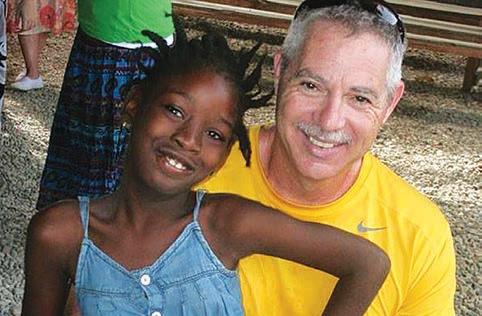
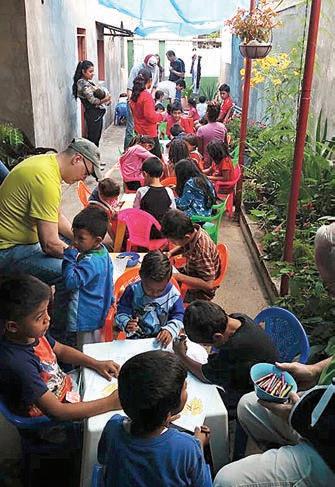



Haiti | A simple photograph of a Haitian girl, taken during a mission trip, has changed her life—and many others who witnessed the event.
IBSA’s 2015 GO Team mission trips led people to several countries, including Jamaica, Guatemala, and Mexico. In the sweltering Haitian heat of July, a group from Third Baptist Church of Marion led Vacation Bible School. Bob Elmore, IBSA’s Short-Term Missions Coordinator, was there and shared the story of a young deaf girl who attended (see photo near right.)

A picture of Adionie was posted on Facebook where a friend of Elmore’s saw it. He contacted a local Haitian Deaf Academy, and soon after, the director called saying they would take her in. Adionie and her mother were located living in a one-room shack, and the mom agreed to let the group drive them there for a tour. When she met the director of the school, Adionie began signing some words she had learned previously.
Elmore said, “We are praising God for this and ask that you pray the pieces continue to come together for this girl who now has the prospect of a better future.”

Following the Supreme Court’s marriage ruling, the threats to religious freedom are very real. With years of experience representing churches and small businesses, the attorneys at Mauck & Baker, LLC, can help you prepare for any legal issues that lie ahead. We are Christian attorneys based in Chicago, serving those who do the Lord’s work.

More women feel disconnected.
45% of U.S. adults are unchurched.
54% of them are men and 46% are women.
That’s a shift from a decade ago when 60% of the unchurched were men, and only 40% women.
43% of women say they do not feel any emotional support from the church.
– Barna Group, June 2015
Springfield | The question is a familiar one. Most pastors and church leaders have asked it at some point: Why are people leaving the church? Every denomination has felt the effects of decline, even Southern Baptists who had maintained growth overall until recently.
To find out why people are really leaving the church, Rodney Harrison set out to interview former Southern Baptist church members and get the real story. He rode his motorcycle all over the country and visited more than 500 former church members in Illinois, Minnesota, Wisconsin, South Dakota, North Dakota, Iowa, Arkansas, Missouri, Kansas, Texas, Washington, and California.
The Dean of Online Education and Director of Doctoral Studies at Midwestern Baptist Theological Seminary, Harrison explained his findings at the 2015 Midwest Leadership Summit in Springfield. Harrison observed that not all church-
es are losing members, but churches in decline have some characteristics in common. Here’s his summary of what the 500 former members told him.
1. People left churches where they didn’t feel the presence of God. What Harrison said he most often heard in his research was “I just didn’t feel the presence of God [in that church] anymore.” Former members often described their former churches as nice places, but lacking, as Harrison put it, “the manifest presence of God.” People left churches “where they don’t feel like God was showing up” more than for any other reason during his qualitative study.
“God’s manifest presence is conditional,” Harrison said. “Rampant sin hinders God’s manifest presence. Often times we invite people to a church that has ‘the flu’—it’s spiritually sick—and we wonder why people come and don’t stay.”
2. People left churches that didn’t value women.
The second most common reason cited for departures among the 500 people Harrison interviewed was disagreement over the roles of women in church life. Some reported feeling that women didn’t have the opportunity to exercise their gifts in fulfilling ways in the churches they attended.
According to him, this does not mean people left because they rejected the complementarian view of men and women. Instead, he said the former SBC church members felt women were under-valued and their contributions weren’t meaningful at the churches they had attended.
Harrison argued there is a biblical precedent for women serving in meaningful ways in the church, citing the examples of Mary the mother of Jesus, Mary Magdalene, Martha, and Lydia.
Continued on page 12
continued from page 11
His research shows, however, that in our time, the roles of women in the church deserves further study before it becomes even more divisive.
3. People left churches that focused on debatable issues. Specifically, in Harrison’s research, disagreement over alcohol use was an issue for some who left. Harrison heard stories of people who chose to leave after they began to serve in leadership, but were asked to sign a covenant forbidding alcohol use.
Harrison recalled a story of a man that was involved at a Southern Baptist church for a while and began serving in leadership roles as a layperson. When he was asked to sign a covenant, the man had to make the difficult decision to leave the church because he was employed in the wine industry.
Churches certainly have the option to ask members to abstain from certain things, even if the Bible does not expressly forbid them. But Harrison said many ex-church members they did not feel that this issue was properly handled in their former churches. Doubts raised in one theological debate raised questions over other issues and caused growing distrust of their leaders.
4. People left churches in conflict.
When strife breaks out in a church that has nothing to do with matters of orthodoxy or faithfulness, people get burned and leave, Harrison said. Many of the churches people left did not have plans in place to deal with church discipline and conflict.
Without a process in place, conflicts often escalated and became antagonistic. Harrison found that conflict came from both the pulpit and the pews. Anecdotally, his interviewees reported that antagonistic members were rarely dealt with in a healthy manner, and pastors often felt unequipped to deal with conflicts.
5. People left uncaring churches.
Ultimately, if a church doesn’t care for its people, people don’t end up caring much for it. Ex-members interviewed told stories of feeling neglected. One of Harrison’s anecdotes told of an elderly woman who spent six months in the hospital without a single visitor from her church.
“Are we ministering to our members?” asked Harrison. “If the answer is ‘no,’ be prepared for diminishing numbers.”
Harrison offers tips for churches to mend their fences and keep their members in the fold:
1. If it’s broke, fix it. “If something isn’t working don’t be afraid to change it, no matter how hard it may be,” he said. Change may not be popular for those who are set in their methods, but for the sake of the church, actively trying to change is the only way forward.
2. Don’t discount ‘uncool’ growth. Most churches focus on growth by conversion (the salvation and baptism of new believers), which is absolutely critical. But in an unhealthy church, the surveyor advised that leaders shouldn’t expect massive conversion growth. They may need to focus on church health before they can lead effective outreach.
In addition to salvations, there are three other types of growth that churches can foster and welcome:
• Reproductive growth is church members having children and multiplying. The family unit is half the size that it was in the 1960’s, but to continue to lead the charge in healthy, godly families, Harrison believes that churches must encourage and rejoice over reproductive growth.
• Transfer growth is acquiring members from other churches. While transfer growth is sometimes seen as less respectable than conversion growth, Harrison said churches
Trinity has demonstrated a very special dedication to the integration of faith and learning by hiring top flight evangelical scholars from different denominational traditions who are seeking to make a mark in the scholarly world for Christ.
brad gundlach | professor of historyTrinity College faculty are committed to mentoring students academically, spiritually, and personally. At Trinity, students grow and mature in their academic disciplines, learning what it means to be a scholar and a professional.
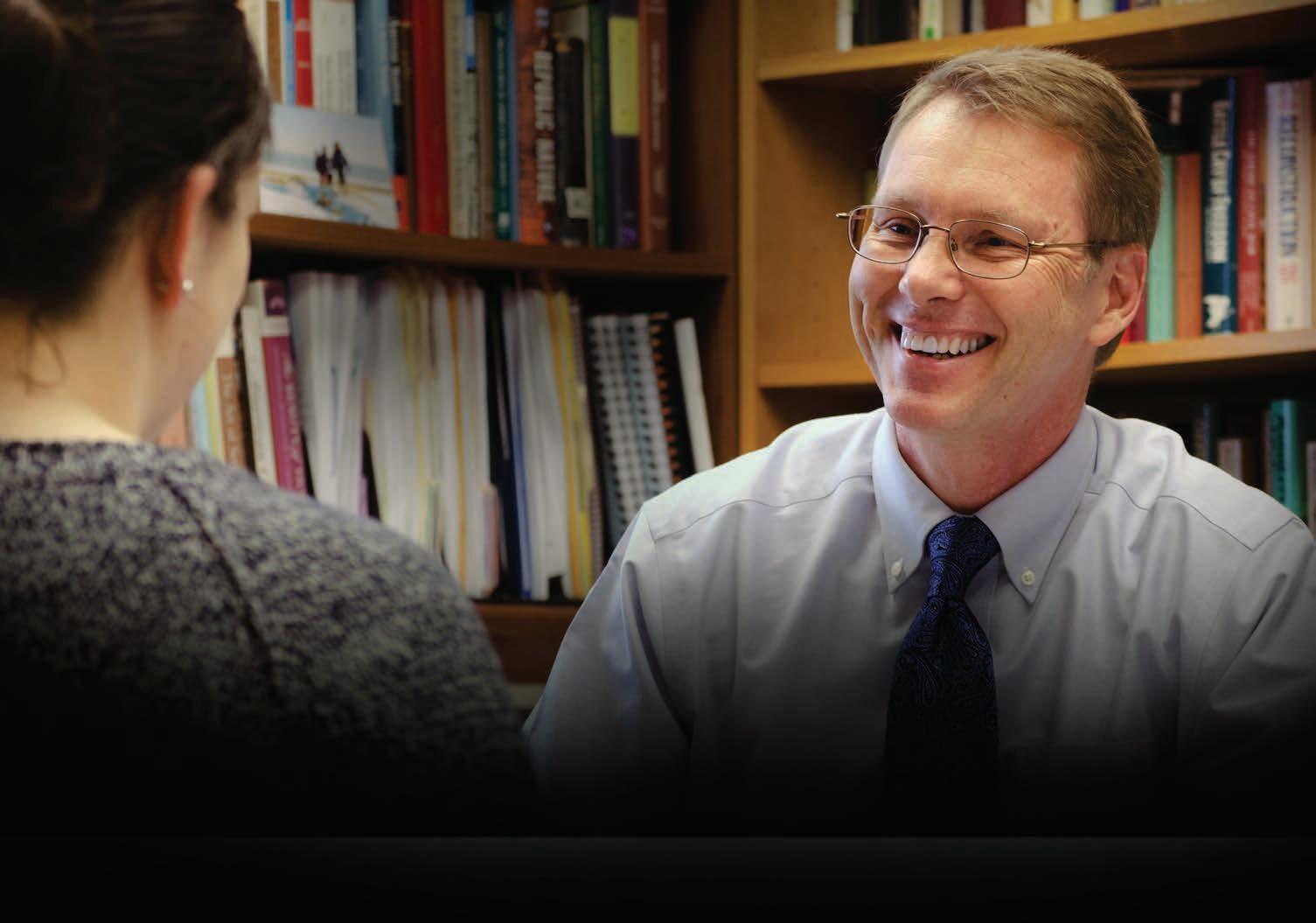
should see this an opportunity to serve those who relocate to a new city or choose to transfer from another church.
• Restoration growth is the reclamation of believers and former church members who have dropped out. According to research from the Barna Group and Princeton University, the largest segments of those who claim to be born-again are not in churches. Harrison said it is critical to develop a plan to bring them into the church community. They are everywhere, hungry for community, and reaching them may be as simple as offering an invitation.
3. Make discipleship everyone’s responsibility.
If the pastor is doing all the work, it means that many members are not being discipled. Healthy churches, Harrison said, have strategies for raising up disciples to serve, lead, and do the work of ministry. If churches are to flourish again, members must be called to something deeper than the Sunday morning experience, into a life of radical dependence on Jesus and regularly experiencing the presence of God.
This content was adapted from a breakout session given by Dr. Rodney Harrison, Dean of Online Education and Director of Doctoral Studies at Midwestern Baptist Theological Seminary, at Advance 2015: The Midwest Leadership Summit held in Springfield.
Which model of political engagement should evangelical Christians adopt in the current American culture? As we see biblical values abused and abandoned by our government and our society, should Christians dig in for the fight or throw up our hands? Is an appropriate mascot for our political stance the bulldog or the ostrich? Are we to be crusaders or monastics? Or is there some other approach?
In a debate on this topic sponsored by the SBC’s Ethics & Religious Liberty Commission, three historical figures emerged as examples for contemporary Christians taking up key social and moral issues in the political arena.
The conference called “The Gospel and Politics” was held Aug. 5 in Nashville and attended by more than 600 people. The “illusion of a Christian majority is now gone,” said ERLC President Russell Moore. Several presenters agreed that it’s a new day for evangelicals and other religious conservatives in the United States.
The Benedict Option
A writer for the American Conservative, Rod Dreher, named this approach after a sixth-century monk who left Rome to pray and serve God. He started monasteries and wrote rules for living in community in culturally difficult times.
While the Benedict Option may be described as a strategic retreat to strengthen Christian communities and institutions, Dreher denied that it is “a call to head for the hills.” Christians can learn from the discipline and community of monks, he said.
“Even as we stay engaged in the public square,” Dreher told the audience, “We have got to retreat somewhat, reclaim our own story as Christians, thicken our practices and build institutions that can be resilient in this post-Christian and, in fact, anti-Christian culture that is emerging.”
The Wilberforce Option

Michael Gerson, Washington Post columnist and former speechwriter for President George W. Bush, suggested this model named after William Wilberforce, the evangelical reformer and member of the British parliament who led the successful effort
to halt the slave trade nearly 200 years ago.
Elements in evangelicalism
“are oriented toward retreat” and are suggesting a “sabbatical from politics,” Gerson acknowledged.
“My blunt reaction to that is only a comfortable Christian could make that claim.”
For an African parent with a child dying of malaria or an American inner-city parent with children in failing schools, retreat is not an option. Such individuals feel compelled to pursue help through political means, and Christians should similarly feel “a relentless demand for justice” that drives them to take political action on behalf of the weak and vulnerable.
“I respect the Benedict Option, but I’m very much for the Wilberforce Option, which is for Christians to be on the cutting edge, the first responders when human dignity is at stake,” Gerson said.

The More Option
This model is named after Hannah More, a contemporary and ally of Wilberforce who worked not only for the abolition of slavery but for other social reforms. It was proposed by Karen Swallow Prior, author and English profes-

sor at Liberty University, who published a biography of More last year.
Prior cited four principles that characterized the approach of More and her colleagues: Christian commitment. In all that they did to bring social reform, “they were deeply rooted in their Christian faith,” Prior said. Moral imagination. “They didn’t rely just on the political process,” she said, adding they used art and literature. More herself wrote poetry, plays and a novel to change people’s thinking. Collaboration with conviction. More and her contemporaries “were not afraid to work with people whose faith, whose commitments, whose principles were different from theirs on common cause,” Prior said. “They built those alliances to get the job done.”
Extensive cultural engagement. One panelist urged that evangelicals “can’t retreat behind high walls…We have to engage, but we can engage differently than we have in the past.”
This article by Tom Strode, Washington bureau chief for Baptist Press, was adapted slightly for the style of this column.
QI’ve taught Sunday school for 27 years, and now they want to fingerprint me. Really?
“Why do Senior Adult Ministries always try to get us to stop acting like senior adults?”

AFirst let me thank you for 27 years of service. What a great testimony! I can only imagine the changes you’ve seen over the years. Perhaps there was a time when you used filmstrips, a record player, flannel graphs, and maps and charts on every wall!
Who would have guessed 27 years ago that churches would be sued for not doing background checks, that pedophiles would target Sunday school classes and other children’s ministries, or that churches would have to take all the extra precautions they must take to protect themselves?
PAT PAJAKThank goodness your church is being diligent. By fingerprinting and doing a background check on every teacher, no one is being singled out, and they are doing their due diligence to protect every member of the church family.
I hope you can not only see the importance and value of taking such measures in today’s society, but also that you will gladly respond (since you have nothing to hide), and encourage all the other teachers to accept this as a positive and protective necessity!
QBefore the battle of the thermostat starts again in the fall, I need a plan. Any advice?
AYou could post a member of the property committee as a guard, or install those Plexiglas boxes with locks to cover the thermostat. Today’s thermostats may require a code or password, but once the code gets out, everyone can change it.
At a church I served in Dalton, Georgia, we installed a “dummy” thermostat at the back of the auditorium. Almost weekly people would adjust it anywhere from 60 to 80 degrees. They were happy that they made the adjustment, even though it never changed the temperature. Only the senior pastor and I knew.
Pat Pajak has pastored churches all across Illinois. He presently leads IBSA’s Church Consulting team. Send your coaching questions for Pat to IllinoisBaptist@IBSA.org.

Meet: Charles Campbell Zone Consultant

Zone: 7 (Kaskaskia, Louisville, Olney, Palestine, Rehoboth and Westfield Associations)


Three retiring Directors of Missions (DOMs) were recently recognized for their service in local Baptist associations: Charles Boling, serving in Williamson from September 1993-May 2015, Jim Shemwell serving in Kaskaskia from April 1996 –fall 2015, and Ron Cremeens serving in Franklin from June 2010-December 2015. They were honored with a cake and prayer while at the IBSA Building in Springfield
Other current roles: IBSA’s Director of Church Planting, Southern Illinois Region; point person for Young Leaders Initiative
Birthplace: Miami, Oklahoma
Family: Charles and his wife, Candi, have been married since 1987 and have three daughters: Carrie, a teacher in Beardstown; Madeline, a high school junior; and Hailey, a sophomore.
Years in Illinois:
Other places you’ve served here: Liberty Baptist Church, Pekin; First Baptist Church, Morton
What makes your zone unique?
Zone 7 has six associations with a mix of moderator-led and DOM-led associations. It also contains some counties where we have little or no Illinois Baptist presence. At the same time, the zone has some of our oldest IBSA churches.
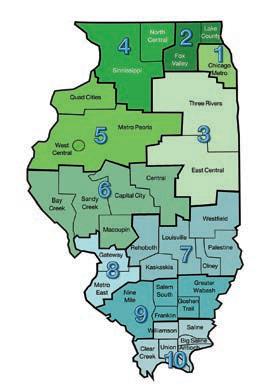
Favorite restaurants in your zone: Don Pedro (Effingham), Joe’s Italian Foods and Pizza (Robinson), Smoky’s House BBQ (Charleston)
IBSA zone consultants work with directors of missions and churches across the state. www.IBSA.org/zone
Find
Welcome
August 10-11 for the Association Roundtable Meeting. Former state DOM Jerry Day was on hand for the event. IBSA congratulates them on their retirements and thanks them for their years of service to His Kingdom.
Dale Davenport has rejoined the IBSA team as a part-time zone consultant in Chicagoland. He retired in 2014 due to health conditions, but has rebounded in recent months. He will serve along with Steven Glover in Zone 1.


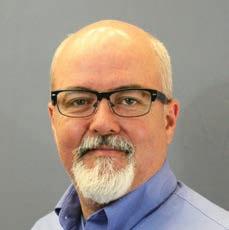
Mike Hall joined Kaskaskia Association as Director of Missions on August 1, succeeding Jim Shemwell who retired after 19 years. Hall served as pastor of First Southern Baptist Church of Rushville for 12 years. He and his wife, Debbie, have a son, Stefan.
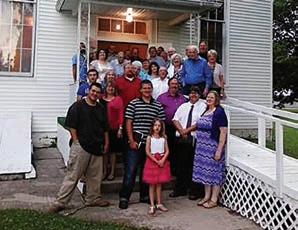

Justin Falloon joined FBC Bethalto as Associate Pastor for Worship and Adult Discipleship. He comes from Heartland Baptist Church in St. Louis, where he also worked as an elementary music teacher. He is married to Erin, and they have two young children.

Farewell

Ridgway First Baptist Church is seeking a full-time pastor. E-mail resumes to ridgway firstbaptistchurch@gmail.com or send to First Baptist Church P.O. Box 436, Ridgway, Illinois 62979. Attn: Pastor Search Committee.
Send
Emmanuel Baptist Church, Carlinville, is seeking a bivocational music minister who feels a definite call from God and is willing to lead our music program, specifically Sunday morning and Wednesday evening. We are looking for an individual who can lead a blended worship service utilizing both a choir and praise band. Send resumes to cliffwoodman@mac.com or pastor@ebccarlinville.org.
Robert Goette died August 9 after a long illness. Goette served as an associational missionary with the Chicago Metro Baptist Association in staff and volunteer capacities. One colleague remembered Goette as “a champion for church planting.” As a former missionary kid, Goette had particular interest in reaching Asian peoples in the U.S. He was founding pastor of Grace Baptist Church in suburban Chicago, a ministry to second-generation immigrants. He is survived by his wife, Julie, and three children.
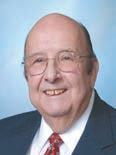
First Baptist Church of Mayfield, KY is currently seeking a full-time Minister of Music/Worship Leader Candidates should be able to lead in both modern and traditional styles of worship, have previous ministry experience, and be passionate about leading others in musical worship. FBC Mayfield is located in Western Kentucky and averages 350 in Sunday morning attendance. Please submit resumes to First Baptist Church, Atten: Search Committee, 118 W. South St., Mayfield, KY 42066, or by e-mail to office@ firstmayfield.com.
September 12
What: Women’s Bible study event

Where: IBSA Building, Springfield
When: 9:30 a.m. to 4:30 p.m.
Cost: $10 per person for IBSA-affiliated churches; $15 for all others; includes lunch Register: www.IBSA.org/women
September 12
Sponsored by LifeWay Christian Resources
Where: Broadview Missionary Baptist
When: 8:30 a.m. to 3 p.m.
Cost: $29 per person Register: www.IBSA.org/education
September 15
What: Training with Gospel music educator Roy Cotton, Jr., and Chicago minister of music and producer Andrae Ambrose
Where: Uptown Baptist, Chicago
When: 7-9 p.m. Register: www.IBSA.org/worship

September 17-18
What: For churches committed to reaching Sub-Sahara Africa
Where: IBSA Building, Springfield Register: www.IBSA.org/missions
September 18-19
Refresh
What: Regional training for worship leaders, with special guest Travis Cottrell
Where: Hannibal-LaGrange University, Mo.
Cost: $50 for both days; $35 for one; $10 for students; maximum of $150 per church Contact: SteveHamrick@IBSA.org
September 19
Where: Baptist Children’s Home Residential Care Campus, Carmi Contact: KenSteward@BCHFS.com
September 25-26
What: Hands-on missions experience for students in grades 7-12
Where: Lake Sallateeska Baptist Camp
Cost: $25 per person; $10 additional fee for lodging Saturday night Register: www.IBSA.org/students
September 26
What: Training for media specialists
Where: IBSA Building, Springfield
When: 8:30 a.m. to 3 p.m.
Cost: $20 per person Contact: DebbieMuller@IBSA.org
October 2-3
What: Missions-focused weekend for boys and girls in grades 1-6
Where: IBSA Building, Springfield
Cost: $15 per person for IBSA-affiliated churches; $20 all others Register: www.IBSA.org/kids
October 9-10
What: Classes in chainsaw, food prep, mudout, childcare, chaplaincy and more
Where: Lake Sallateeska Baptist Camp
Cost: $30 new trainees, $10 renewals Register: www.IBSA.org/dr
October 11
Youth Encounter

What: Conference for students in grades 7-12; 3-10 p.m.
Where: Hillcrest Baptist, Country Club Hills; Tabernacle Baptist, Decatur; Logan Street Baptist, Mt. Vernon
Cost: $25 per person (IBSA churches until Oct. 8, dinner included). $30 all others. Register: www.IBSA.org/YE2015
QMy wife and I are thinking about selling our home. I was recently let go from the military due to downsizing, and I’ve begun a job in real estate. My wife brings home about $3,500 a month as a teacher, and the only debt we have is our house payment of $1,616 a month. I was given a $35,000 severance package, but we need some advice to help bridge the financial gap.
AHaving little or no income is a lot harder than a variable income situation. Your wife is bringing home good money, but at the moment your house payment is almost half that amount. Are there some things you can do on the side while you’re getting your real estate business going that will create income? If you could make even
$1,000 to $2,000 a month, it would change the picture entirely. You guys would be able to keep your home and have a little breathing room while you get your real estate career off the ground.
It takes about six to nine months to start making a living in the residential real estate business. All this really hinges on is how badly you want a career in real estate and how much you guys want to keep your home. If you want it enough, you’ll do what it takes to get there. And for the time being that’s going to mean supplementing your income with something on the side while you grow your real estate business!
Financial advisor Dave Ramsey is a prolific author and radio host.
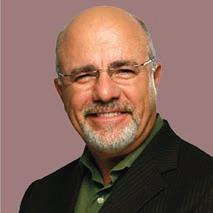
Ilove those 30-minute home makeover shows. But as my husband has pointed out, a complete renovation can’t be done in a half-hour. Behind the scenes, there’s a crew working for weeks or months. The same should be true as we develop leaders for ministry. Growing leaders is a long-term project.
1. Assess the leadership needs, present and future. New leaders can bring new perspective and a fresh burst of energy to an existing team. But the key phrase is “can bring.” Before you bring in new leadership, it’s crucial to know who you need and what you are recruiting them to do.
CARMEN HALSEYLocation: Godfrey
Focus: Godfrey is a village of around 18,000 people, located 35 miles north of St. Louis.

Characteristics: With the completion of highway projects, the village expects both residential and commercial growth.
Prayer needs: Pray for a planter to adopt this city with the goal of starting a new church to reach people who don’t know Christ.
A common mistake is to promote an individual from one area of leadership assuming they will be effective in another area. But just because an individual performed well with one set of responsibilities does not guarantee desired performance in another. We have a responsibility to individuals and to the organization to identify the right person for the right job.
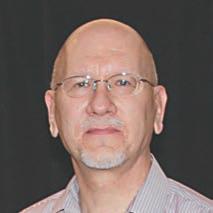
2. Prepare current leaders to welcome new leaders. Bringing in a new generation of leadership can disrupt current practices, create insecurities, redirect attentions and alter working relationships. Individuals won’t always assess the value that a new leader brings to the team as much as they will assess what the addition of the new leader will do to their individual zone of influence. These concerns must be proactively addressed in order for the new leadership to be viable and not rejected.
3. Identify and support new leaders. A healthy organization will always invest in the ongoing development of their people. If this practice is followed, a perpetual supply of leaders will be available to meet the ongoing organizational needs.
Once potential leaders are identified, the question must be asked, can we afford them? Can we provide the tools they are accustomed to working with (technology, work environment, etc.). The more realistic question would be, can we afford not to support them? Assess how the organization can support new leaders, keeping them encouraged and engaged. Just be aware, it may take more than half an hour.
Carmen Halsey is IBSA’s director of women’s ministry and church missions.
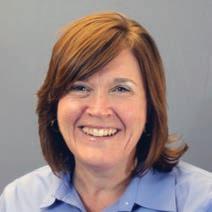
“He didn’t have an impressive form or majesty that we should look at Him, no appearance that we should desire Him” (Isaiah 53:2b, HCSB).
A recent news story tells of a man who sued his wife for fraud after seeing her for the first time without make-up. They were married in Algeria. The morning after their wedding night he awoke to find his wife “bare faced.” He claims that the change was so dramatic that he thought she was a thief who had come into his home. He is suing her for trauma and has valued his “shock and suffering” at $20,000.
Isaiah 53 describes the life and ministry of Jesus. He was also despised. The gospels reveal that Jesus was rejected, in part, because he did not represent those things considered important to most people, for example, wealth, prestige, reputation, being served by others. Where do you look for the validation of your life? Is it achievement, or recognition, or popularity?
Beware: the more you focus on this world, the more vague your discipleship with Jesus will become. Let us heed the words of the hymn that admonishes us to “turn your eyes upon Jesus, look full in His wonderful face, and the things of earth will grow strangely dim, in the light of His glory and grace.”
PRAYER PROMPT: O God, help me so delight in Your beauty that the things of this world become unappealing.
Odis Weaver is pastor of Friendship Baptist Church in Plainfield and is currently serving as president of IBSA. Pastors are invited to join the online “IBSA Pastors’ Prayer Room” by e-mailing oweaver7307@gmail.com.

The kids have gone back to school, so now let’s go back to church. That’s the idea behind National Back to Church Sunday, September 13. Right after Labor Day is one of those times when the number of church visitors increases. How can we prepare?
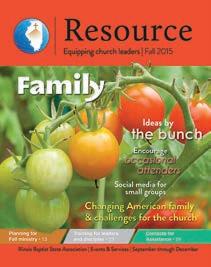

Smiles, everyone. Practice your greetings. Put it plainly: let’s make people feel welcome, not just at the assigned hand-shaking time, but before and after the service, too.
Two-minute warning. As with the last moments of an NFL game, assign the greeting to the last two minutes of the service. Encourage people to stick around and talk, or invite the guests to lunch at a local restaurant.
Check the signage. Invite a stranger to assess the effectiveness of the signs in your buildings, especially for the restrooms and children’s area. Paint the entryway. The rest of the place may need it too, but at least spruce up the lobby.
Best face forward. Assign the friendliest greeters for the month of September in a variety of ages. Review the basics of making people feel welcome and giving directions.